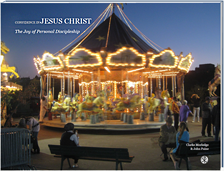As you might imagine, truth is a very important topic on a blog named Veracity. Veracity is a one-word description of the Bible. The Bible is true. Most people really have no idea how true. Unfortunately, some believe that it is true because they feel it is true. Others hope that it is true without ever really knowing how true it really is. Agnostics doubt that it is true. Skeptics believe it is untrue.
So how important is it that your faith be based on truth? It sounds like a silly question, but it has profound personal implications. When you engage others about your faith, do you say things like, “This happened to me,” or ” I feel that…”? Unfortunately, these type of statements can point to a subjective faith. But Christianity is much truer than that.
Veracity is also a one-word description for Jesus Christ, taken from his own words:
Jesus said to him, “I am the way, the truth, and the life. No one comes to the Father except through Me.”
John 14:6
So, ultimately, truth is a person. Got it. Plain and simple. But is it an objective truth?
I’m currently preparing to teach a class on personal discipleship, which we define here at Veracity as “the process in which a believer or seeker takes personal responsibility for investigating the claims and content of the Bible.” It is personal and inherently objective. And it should be.
The class will be full of mature Christians. Many of these folks have spent a lifetime studying the Bible, and can offer encouragement to anyone who wants to ask questions. They have encouraged me. I’m hoping to give back by delving a little more deeply and father off the sacred page than most are accustomed to exploring. It will require an open mind that thirsts for the truth. No dogma, no “This is the way I’ve always thought it to be,” and no fear of what we might discover. If successful, some may find a more intimate appreciation of the Bible and the veracity of their faith. But it requires an honest assessment of our biases (we all have them), and an open and objective mind.
Anyway, I spend hours and hours looking at videos, trying to find just the right ones that will fit within the class schedule and leave time for discussion. There’s a ton of candidate material to share from brilliant apologists like Ravi Zacharias and John Lennox. There are studied academics like Daniel Wallace, Darrell Bock and Craig Evans. Theologians and philosophers like William Lane Craig and Alvin Plantinga. Seminarians like Michael Kruger, Norman Geisler and Gary Habermas. Pastors and teachers like Dick Woodward, Tim Keller and Andy Stanley. Scientists like Hugh Ross and Francis Collins. And a retired cop.
J. Warner Wallace
A retired cop?! Yup. J. Warner Wallace was a keynote speaker at the 2014 National Conference on Christian Apologetics. When my friends and I were looking at the conference syllabus, we had heard of his ministry but it sounded pretty much like a shtick to us—“A cold-case homicide detective looks at the Resurrection.” But we were blown away at his sessions. He is likely one of the most gifted rhetoricians you will ever hear. There’s nothing wrong with good rhetoric—St. Augustine of Hippo was a professor of rhetoric and one of the most influential thinkers in the early Christian church. Martin Luther King, Jr. successfully persuaded the majority of Americans that racism is wrong and that it was time for the country to move in a more just direction. We need good rhetoric.
By way of background, Jim Wallace had a storied career as a homicide investigator in Torrance, California. Right before he spoke at the Charlotte conference, his last case was chronicled on the TV news program NBC Dateline. (Four of his cases have been featured on Dateline—he never lost a single case in his career as a cold-case homicide detective.) It was the oldest homicide cold case ever brought to trial in the United States, and the defendant’s lawyer was none other than Robert Shapiro, the famous Hollywood attorney from the O.J. Simpson case. It was Shapiro’s last court case. You can watch the NBC Dateline video to see what happened.
I will show some of his remarkably persuasive and compelling videos during the upcoming personal discipleship course but want to put this one out to Veracity readers. The truth matters—if we’re not after the truth, what’s the point in studying the Bible?



January 9th, 2015 at 3:14 pm
It sounds like a great class, John. I’m looking forward to it.
LikeLike